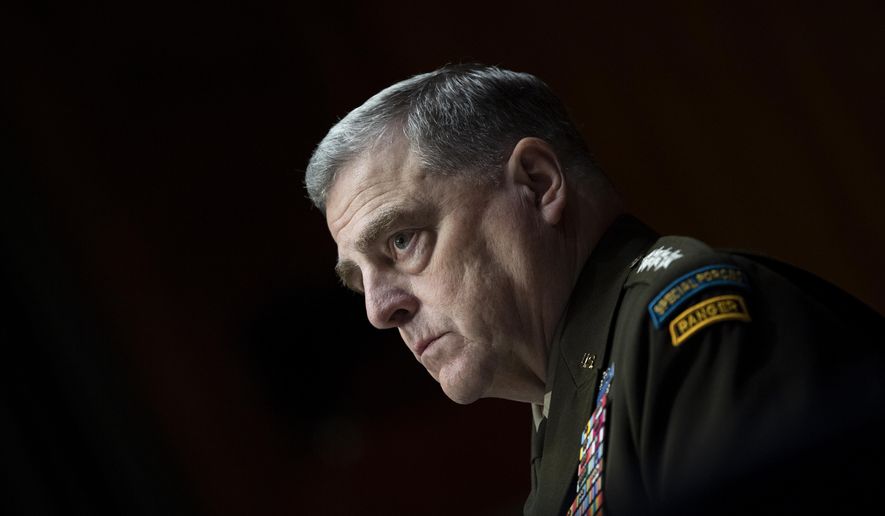China’s military forces have not developed the ability to carry out a military assault against the island of Taiwan, despite a large-scale build-up by Beijing in recent years, the chairman of the Joint Chiefs of Staff told Congress on Thursday.
Army Gen. Mark Milley made the assessment during a Thursday hearing of the Senate Appropriations Committee when asked about China’s announced determination of eventually reuniting the island state with the mainland.
Recently the current and former commanders of the Indo-Pacific Command offered differing assessments on when China could conduct an amphibious assault on Taiwan.
“I think China has a ways to go to develop the actual no-kidding capability to conduct military operations to seize through military means the entire island of Taiwan if they wanted to do that,” Gen. Milley said.
The four-star general declined to provide details on the basis of his assessment in a public hearing but said the probability of a military attack on Taiwan is low. “There is no reason [for China] to do it militarily. So I think right now it is probably low — in the immediate near-term future,” Gen. Milley said.
Chinese officials say that reclaiming Taiwan, however, remains a “core” national interest.
“The internal politics of China are up to China, as long as whatever is done is done peacefully and doesn’t destabilize the region nor the world,” Gen. Milley added.
Outgoing U.S. Pacific commander Adm. Philip Davidson told Congress in March that China could launch a Taiwan invasion within the next six years.
“Taiwan is clearly one of their ambitions before that. And I think the threat is manifest during this decade, in fact, in the next six years,” Adm. Davidson told the Senate Armed Services Committee.
China has been engaged in a large-scale military buildup for decades that includes the deployment of more than 1,200 missiles within range of Taiwan. Beijing also has been developing amphibious assault and precision-strike bombing capabilities.
Satellite photos made public several years ago revealed mock-ups inside China of Taiwanese political and military sites, in apparent preparation and training for an attack on the island.
The assessment of a Taiwan attack was based on an expansion of Chinese military forces in the region, one that threatens to undermine U.S. defense efforts to deter an attack.
“We are accumulating risk that may embolden China to unilaterally change the status quo before our forces may be able to deliver an effective response,” Adm. Davidson said in March. “I cannot for the life of me understand some of the capabilities that they’re putting in the field unless … it is an aggressive posture.”
The admiral’s successor, Adm. John Aquilino, testified at his confirmation hearing that a Chinese attack on Taiwan could come sooner than six years. A Chinese assault is “much closer than most think,” said Adm. Aquilino, the current Indo-Pacific commander.
“We have to take this on, put those deterrence capabilities like [the Pacific Deterrence Initiative] in place in the near term and with urgency,” Adm. Aquilino said in March.
The initiative is a congressional effort to bolster U.S. forces in the Pacific.
Defense Secretary Lloyd Austin told the Thursday budget hearing there was “no question” China wants to unite Taiwan with the mainland.
“In terms of what the timeline or time frame for that is, is left to be seen and, of course, there are a number of intelligence estimates that address that issue,” he said. “Our position is that we remain committed to helping the defense of Taiwan in terms of providing the ability for them to defend themselves in accordance with the Taiwan Relations Act and the Three Communiques and the Six Assurances.”
The communiques and diplomatic exchanges were concluded in the 1970s and 1980s after the U.S. established formal diplomatic relations with Beijing and de-recognized the Taiwan government.
Mr. Austin said it’s “very likely” the Chinese will seek reunification sometime in the future.
Taiwan is located about 100 miles off the southern coast of China. Nationalist forces fled to the island after losing a civil war to Mao Zedong’s Communists in the late 1940s.
Over the decades, Taiwan has grown into a vibrant democracy and economic powerhouse. During the Trump administration, relations with Taiwan were strengthened and more than $16 billion in new arms deals were offered.
Taiwan also has recently developed new medium-range missile capabilities that would make China vulnerable to retaliation by missile strikes on cities like Shanghai and Shenzhen in the event of an invasion by Beijing.
• Bill Gertz can be reached at bgertz@washingtontimes.com.




Please read our comment policy before commenting.